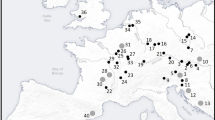Abstract
The term ‘ historical archaeology’ originated in the United States and was subsequently adopted in Canada, Australia, New Zealand, and South Africa, all places subjected to European colonization during the last few centuries. The idea of historical archaeology has had relatively little application in Europe, birthplace of the antithetical idea of prehistory. In Africa, other than at the southern tip of the continent, the practice of what is called historical archaeology has developed only recently and the relevance of the concept in Africa might be questioned. There are chronological problems in its application: not only are the interfaces between preliterate and literate societies spread over thousands of years in different areas but they can at times be regressive. The matter is further complicated if the term historical archaeology is used for societies whose history is oral not written. However, there is an ambiguity in this concept that also has methodological and other connotations. In these respects the idea of historical archaeology does perhaps have a place in Africa as a whole, but it represents a compartmentalization of our discipline still inadequately defined.
Résumé
Le concept d’« archéologie historique » a pour origine les États-Unis et a ensuite été adopté au Canada, en Australie, en Nouvelle Zélande et en Afrique du Sud. Autrement dit, dans tous les pays qui ont fait l’objet d’une colonisation lors des siècles derniers. L’idée d’archéologie historique est peu répandue en Europe où prévaut la notion antithétique de préhistoire. En Afrique, mise à part l’extrémité sud du continent, la pratique de ce que l’on appelle l’archéologie historique s’est développée uniquement récemment ; aussi la pertinence de ce concept pourrait être remise en cause. Il existe des problèmes chronologiques qui ont une incidence sur son application : non seulement les interfaces entre les sociétés pré-alphabétisées et alphabétisées s’étendent dans différentes zones sur plusieurs milliers d’années, mais elles peuvent parfois être régressives. Le sujet se complique davantage si le concept d’archéologie historique est utilisé pour des sociétés dont l’histoire est orale et non écrite. Il existe alors une ambiguïté qui a des incidences méthodologiques et autres. Sous ce rapport, l’idée d’archéologie historique a sans doute une raison d’être en Afrique dans son ensemble, mais représente une compartimentalisation encore inadéquatement définie de notre discipline.
Similar content being viewed by others
References
Bintliff, J. (1991). The contribution of an Annaliste/structural history approach to archaeology. In J. Bintliff (Ed.), The Annales School and archaeology (pp. 1–33). Leicester: Leicester University Press.
Connah, G. (Ed.) (1983). Australian journal of historical archaeology 1 (Also Vols 2–6 and Australasian Historical Archaeology 12).
Connah, G. (1988). ‘Of the hut I builded’: The archaeology of Australia’s history. Cambridge: Cambridge University Press.
Connah, G. (1993). The archaeology of Australia’s history. Melbourne: Cambridge University Press (paperback edition).
Hall, M., & Silliman, S. W. (Eds.) (2006). Historical archaeology. Malden, MA: Blackwell.
Ibn Fartua, A. (translated by H.R. Palmer) (1926). History of the first twelve years of the reign of Mai Idris Alooma of Bornu (1571–1583). Lagos, Nigeria.
Kirkman, J. S. (1957). Historical archaeology in Kenya 1948–1956. Antiquaries Journal, 37, 16–29.
Lawrence, A. W. (1963). Trade castles and forts of West Africa. London: Jonathan Cape.
Lightfoot, K. G. (1995). Culture contact studies: Redefining the relationship between prehistoric and historical archaeology. American Antiquity, 60(2), 199–217.
Phillipson, D. W. (1985). African archaeology. Cambridge: Cambridge University Press.
Posnansky, M. (1959). Progress and prospects in historical archaeology in Uganda. In M. Posnansky (Ed.), Discovering Africa’s past (pp. 31–39). Kampala, Uganda: Uganda Museum Occasional Paper 4.
Posnansky, M., & DeCorse, C. R. (1986). Historical archaeology in Sub-Saharan Africa—A review. Historical Archaeology, 20(1), 1–14.
Reid, A. M., & Lane, P. J. (Eds.) (2004). African historical archaeologies. New York: Academic.
Robertshaw, P. (2004). African historical archaeology(ies): Past, present and a possible future. In A. M. Reid & P. J. Lane (Eds) African historical archaeologies (pp. 375–391). New York: Academic.
Robertshaw, P. (2005). Review of African connections: Archaeological perspectives on Africa and the wider world. By Mitchell, P. 2005. AltaMira Press, Walnut Creek. Journal of African Archaeology, 3(2), 301–303.
Sassoon, H. (1981). Ceramics from the wreck of a Portuguese ship at Mombasa. Azania, 16, 97–130.
Schmidt, P. R. (1978). Historical archaeology: A structural approach in an African culture. Westport, CT: Greenwood Press.
Schmidt, P. R. (2006). Historical archaeology in Africa: Representation, social memory, and oral traditions. Lanham, MD: AltaMira Press.
Schuyler, R. L. (1978). Historical and historic sites archaeology as anthropology: Basic definitions and relationships. In R. L. Schuyler (Ed.) Historical archaeology: A guide to substantive and theoretical contributions (pp. 27–31) New York: Baywood, Farmingdale (Originally published in 1970 in Historical Archaeology, 4, 83–89).
Wesler, K. W. (Ed.) (1998). Historical archaeology in Nigeria. Trenton, NJ: Africa World Press.
Author information
Authors and Affiliations
Corresponding author
Rights and permissions
About this article
Cite this article
Connah, G. Historical Archaeology in Africa: An Appropriate Concept?. Afr Archaeol Rev 24, 35–40 (2007). https://doi.org/10.1007/s10437-007-9014-9
Published:
Issue Date:
DOI: https://doi.org/10.1007/s10437-007-9014-9




